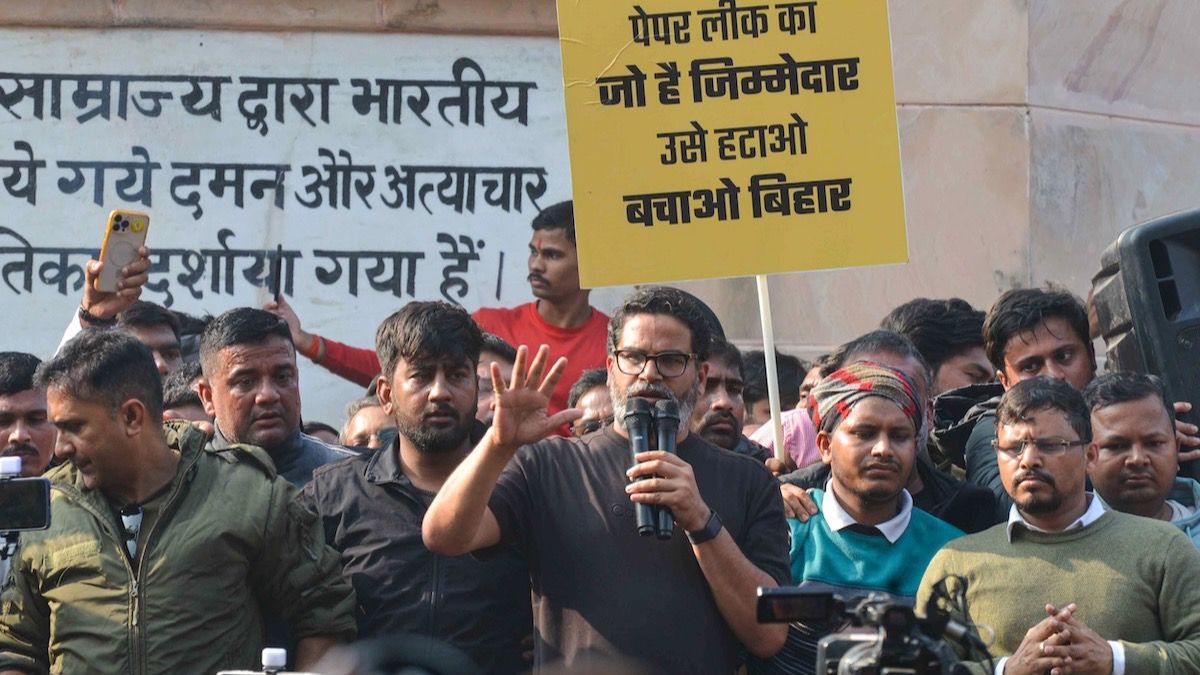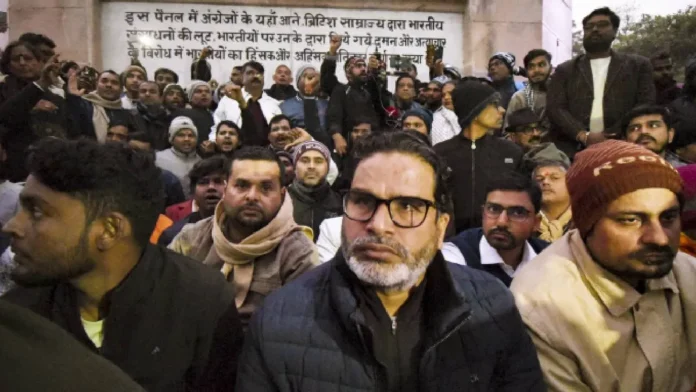The BPSC Protest led by Jan Suraaj Party chief Prashant Kishor has escalated as he launched a hunger strike to press for the cancellation of the Integrated Combined (Preliminary) Competitive Examination (CCE) 2024 conducted by the Bihar Public Service Commission (BPSC). Kishor criticized Bihar Chief Minister Nitish Kumar for ignoring students’ demands and accused him of prioritizing power over public welfare.
Kishor’s hunger strike began amid severe cold and growing unrest among students who allege irregularities in the December 13 examination. The activist-turned-politician vowed to continue his protest until the government addresses the grievances of the aspirants.
BPSC Protest Demands Transparency And Justice
The BPSC Protest stems from allegations of widespread irregularities in the CCE 2024 preliminary examination. Students boycotted the test at the Bapu Examination Centre due to delayed question papers, lax security measures, and the alleged use of mobile phones during the exam.
While the BPSC canceled the examination for the affected candidates and rescheduled it for January 4, aspirants have demanded the cancellation of exams across all centers, citing systemic issues. The lack of a comprehensive response from the government has further fueled tensions.
Prashant Kishor has accused the government of insensitivity, stating, “The remedy is that the government must talk to the students. They have even said that if the Chief Minister meets them and assures them there won’t be re-exams, they will unconditionally call off their protests. However, the state’s leader refuses to meet his own children.”

Clashes And Continued Resistance Amid The BPSC Protest
The protest took a violent turn on December 29 when students marching towards the Chief Minister’s residence faced water cannons and baton charges by the police. Several protesters sustained injuries in the confrontation, adding to the growing dissatisfaction with the administration’s handling of the situation.
Meanwhile, supporters of Purnea MP Pappu Yadav organized a ‘rail roko’ at Sachiwalay Halt Railway Station to support the students. The blockade disrupted train services briefly before police dispersed the demonstrators.
Despite assurances from Bihar Chief Secretary Amrit Lal Meena that the students’ concerns are being considered, the government has not issued a clear statement on the matter. This silence has left students dissatisfied and determined to continue their agitation.
Prashant Kishor’s Hunger Strike And Political Commentary
Prashant Kishor’s indefinite hunger strike has become a focal point of the BPSC Protest. Kishor dismissed allegations that his involvement is politically motivated, asserting that his support for the students is a response to their suffering. “If you beat someone, and I am sitting here in support of them—and then you call it politics, then I am doing the politics,” he remarked.
Kishor also accused Nitish Kumar of neglecting public welfare during critical times, such as the Covid-19 pandemic, and claimed that the Chief Minister is more focused on retaining power than addressing the needs of the people.
“This is against the egoistic government whose leader did not even consider meeting the students despite their willingness to withdraw from the movement if assured. The students were beaten up by the authorities. Hence, I am on an indefinite hunger strike,” Kishor said.

Historical Context Of The BPSC Protest
The controversy surrounding the December 13 examination is not an isolated incident. In recent years, allegations of irregularities and corruption in competitive exams have plagued Bihar’s recruitment processes. The BPSC Protest highlights recurring challenges in maintaining transparency and fairness in these exams, which are a gateway to government jobs.
Over five lakh candidates appeared for the December 13 exam, making the scale of the issue significant. Aspirants have called for a thorough inquiry into the examination process and a re-examination across all centers to ensure justice.
The administration’s decision to reschedule the exam for affected candidates at the Bapu Examination Centre has been criticized as insufficient. Students argue that such measures fail to address the root causes of the irregularities and compromise the credibility of the recruitment process.
Public Sentiment And The Path Ahead
The BPSC Protest has garnered widespread attention, with students, activists, and political leaders uniting to demand justice. The agitation reflects broader discontent with governance and accountability in Bihar’s public institutions.
As the January 4 re-examination date approaches, the government faces mounting pressure to address the students’ grievances comprehensively. The outcome of the protest will likely have far-reaching implications for the state’s education and employment systems.
For now, the protesters remain resolute in their demands, emphasizing the need for transparency, accountability, and respect for democratic principles in addressing their concerns.

